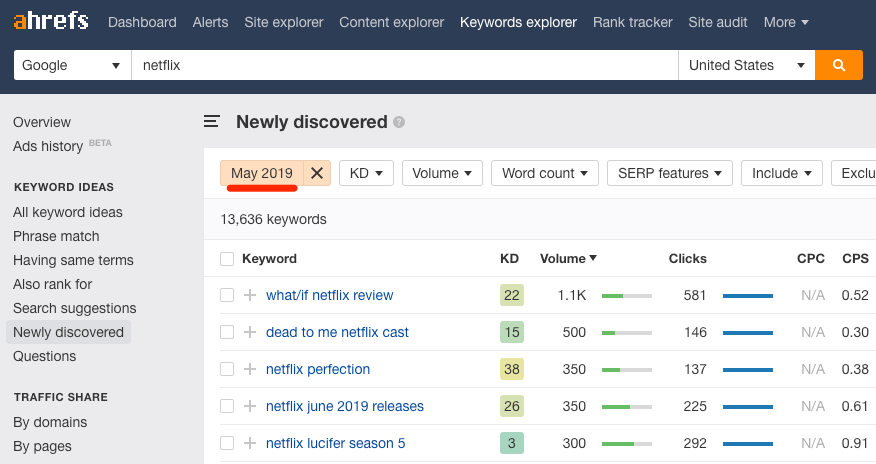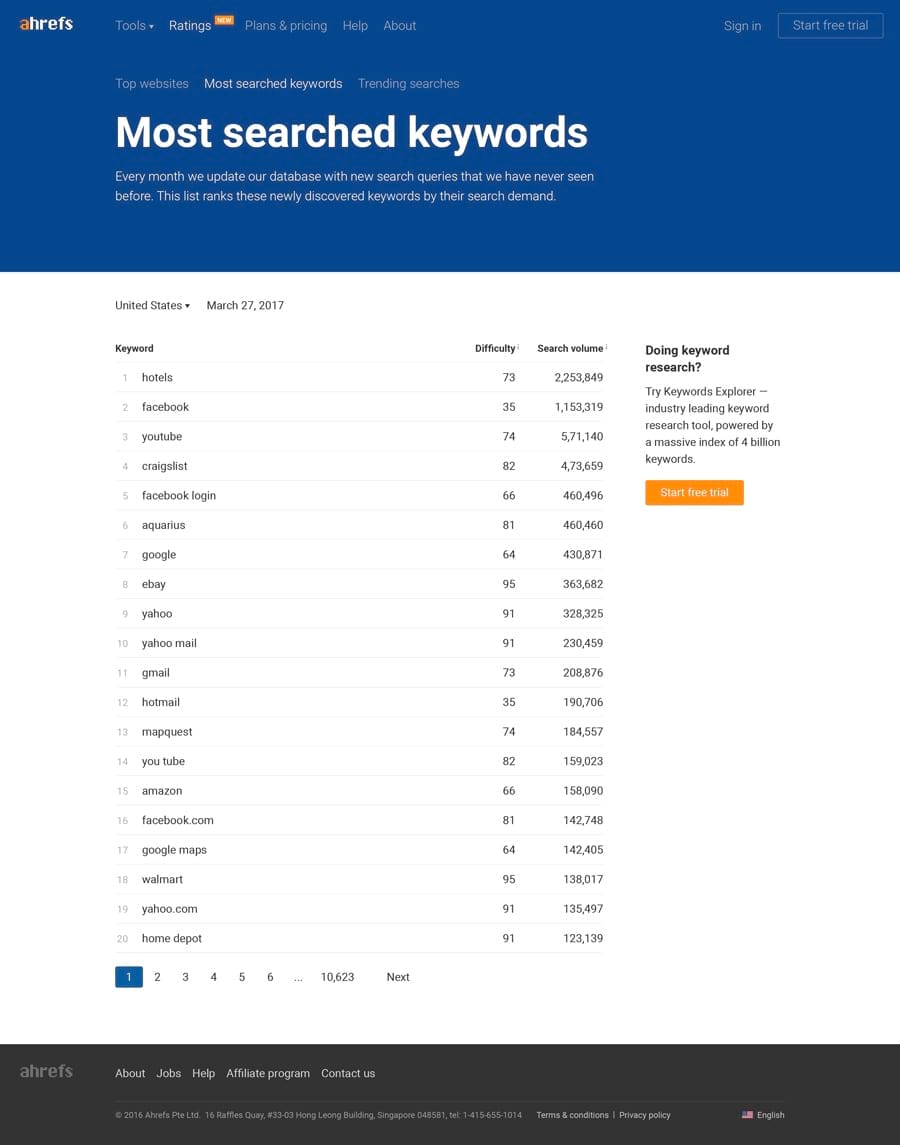Click and see more
We have pulled two lists for the United States:
So here you go:
Before we move on to the next list of trending keywords, it’s important to understand the keyword metrics that we display.
But Return Rate is very useful when comparing two keywords.
For example, the keyword “spotify” has RR 1.78, which means that people rarely search for that keyword again. (Probably because they were just looking to download this app or learn what it is.)
On the other hand, “facebook” has RR 11.47, which means that people search for it quite frequently. (Probably because many people don’t have Facebook on their bookmarks bar, and simply Google it each time they want to access it.)
Learn more about search volume & Return Rate here.
What’s interesting, is that some of these new keywords had a big spike in search demand and then faded to nothing quite fast. While others seem to have a continuous search demand, that shows no signs of fading.
“oneplus 7 pro verizon” vs “whatsapp hacked today” are two great examples:

I didn’t include Return Rate this time, because the vast majority of these Google searches were very close to 1.
But I included Keyword Difficulty metric, which is quite low for almost all keywords in the list (since they’re brand new).
Given that KD scores for most of these keywords are so low, I wonder if this very article will rank for some of them?
And that’s it for the US.
Let’s look at what bothered people around the world.
It looks like queries related to the European Parliament elections dominate this list.
Keywords Explorer > enter a seed keyword > Newly discovered
You can do some seriously cool stuff with this!
For example, imagine that you run a movie reviews website.
You could enter “Netflix” as your seed keyword and find all the newly‐discovered Netflix‐related terms that we discovered in the last month.

It looks like Netflix’s What/If is especially popular right now.
Seriously, this is a potential goldmine of keyword opportunities. So please do play around with it and see what you can find. 🙂
I’m quite embarrassed to admit it, but we still haven’t had a chance to finish making this.
(In all honesty, we got carried away with the brand new Rank Tracker and Site Audit tools.)
But it is ~80% complete—here’s a preview:

We’re hoping to have this ready for you soon!
Stay tuned! 🙂
Are you wondering what people in the United States (and around the World) are searching for the most? Then you’re in luck!
We’ve just uploaded fresh data from the previous month into Keywords Explorer—our monstrous keywords database—and naturally, we wanted to know which Google searches were most popular this month.
Sidenote.
the total size of Ahrefs’ keywords database is now 7.9 BILLION keywords (3.3
billion of which are Google search queries from the United States
alone). Which makes our database the biggest one in our industry.- Top 100 most searched keywords in the US—a list of terms with the highest average monthly search volume as of today;
- Top 100 new keywords in the US—a list of the most popular search queries that we haven’t seen up until last month.
So here you go:
Top 100 Google search queries in the US (as of May 2019)
Unsurprisingly, this list is almost entirely dominated by branded searches. But we have decided to leave the list as is so that you could see the full picture.
Sidenote.
We removed all NSFW queries from this list. What you see above are the top 100 “clean” search queries. Here’s the raw, uncensored list for those that want it. (You’ve been warned!)Search volume
Search volume shows how many times a given keyword is being entered into Google per month. And, because the search demand on many keywords tends to fluctuate from month to month, the number that we give you is an annual average.
Sidenote.
here at Ahrefs we calculate search volumes by modeling data from Google Keyword Planner against clickstream data (learn more here). This method has proven to be quite accurate and we keep tweaking our model to achieve even better results.Return Rate
Return Rate shows how often a person will search for that keyword again. It is a relative metric, so RR 3.55 doesn’t mean that people perform the same search 3–4 times a month on average.But Return Rate is very useful when comparing two keywords.
For example, the keyword “spotify” has RR 1.78, which means that people rarely search for that keyword again. (Probably because they were just looking to download this app or learn what it is.)
On the other hand, “facebook” has RR 11.47, which means that people search for it quite frequently. (Probably because many people don’t have Facebook on their bookmarks bar, and simply Google it each time they want to access it.)
Learn more about search volume & Return Rate here.
Top 100 NEW Google searches in the US (as of May 2019)
This list is much more interesting because it shows things that people in the US have started to care about all of a sudden.What’s interesting, is that some of these new keywords had a big spike in search demand and then faded to nothing quite fast. While others seem to have a continuous search demand, that shows no signs of fading.
“oneplus 7 pro verizon” vs “whatsapp hacked today” are two great examples:

I didn’t include Return Rate this time, because the vast majority of these Google searches were very close to 1.
But I included Keyword Difficulty metric, which is quite low for almost all keywords in the list (since they’re brand new).
Keyword Difficulty
Keyword Difficulty score shows how hard it would be to rank in top 10 search results for a given keyword (learn more here). It is based on the size and quality of the pages that already rank there.Given that KD scores for most of these keywords are so low, I wonder if this very article will rank for some of them?
And that’s it for the US.
Let’s look at what bothered people around the world.
Top NEW Google searches around the World (as of May 2019)
I know Ahrefs has a ton of customers from all around the world, and hopefully, everyone will find a fun keyword from their country on this list.It looks like queries related to the European Parliament elections dominate this list.
Top NEW Google searches in YOUR niche (as of May 2019)
Did you know that you can use the “newly discovered” feature in Keywords Explorer to find search queries (containing any “seed” keyword) that were recently added to our database?Keywords Explorer > enter a seed keyword > Newly discovered
You can do some seriously cool stuff with this!
For example, imagine that you run a movie reviews website.
You could enter “Netflix” as your seed keyword and find all the newly‐discovered Netflix‐related terms that we discovered in the last month.

It looks like Netflix’s What/If is especially popular right now.
Sidenote.
We use clickstream data to discover new search queries, so some long‐tail keywords may come in a little delayed.Free mini‐tool is coming soon… we (still) promise!
Back when the original version of this article was first published (April 2017), I mentioned that we were working on a mini‐tool that would be updated with fresh data from all countries… every month.I’m quite embarrassed to admit it, but we still haven’t had a chance to finish making this.
(In all honesty, we got carried away with the brand new Rank Tracker and Site Audit tools.)
But it is ~80% complete—here’s a preview:

We’re hoping to have this ready for you soon!
Stay tuned! 🙂

Yorumlar
Yorum Gönder